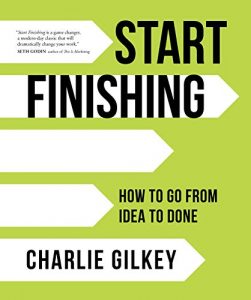 Start Finishing: How to Go from Idea to Done . Charlie Gilkey
Start Finishing: How to Go from Idea to Done . Charlie Gilkey
I suspect that diet books are the only non-fiction category with more titles than time management and productivity. Perhaps I would be better served if I shifted to reading diet books.
Like diet books, I once read these books in quest of the perfect system; the answer that would guide me waking and guard me sleeping. What I seek these days is much the same as I do with Compline[add link] ; reassurance that I am not alone in my struggles and the possibility of insights I can fold into my practices. Charlie Gilkey’s Start Finishing offers both in good measure. I think what got me hooked this time was this point of tangency with my thinking:
Most of what I read didn’t hit the target, though. The personal productivity literature was too nitty-gritty and focused on tasks, and the personal development literature focused on principles and big ideas. But my problem was in the messy middle where creative projects live.
I’ve been exploring this messy middle myself for some time. It’s where I keep running into trouble. There’s a scene in The West Wing where Leo shares the following story with Josh:
This guy’s walking down the street when he falls in a hole. The walls are so steep he can’t get out.
A doctor passes by and the guy shouts up, ‘Hey you. Can you help me out?’ The doctor writes a prescription, throws it down in the hole and moves on.
Then a priest comes along and the guy shouts up, ‘Father, I’m down in this hole can you help me out?’ The priest writes out a prayer, throws it down in the hole and moves on
Then a friend walks by, ‘Hey, Joe, it’s me can you help me out?’ And the friend jumps in the hole. Our guy says, ‘Are you stupid? Now we’re both down here.’ The friend says, ‘Yeah, but I’ve been down here before and I know the way out.’
Gilkey has solid insight and advice for finding the way out.
The two most useful elements of his approach are guidance on breaking projects down into manageable chunks and an interesting way to think about blocks of time at different scales. Gilkey repeats the fairly conventional advice that chunks of work are best described with a crisp combination of verb and object; “analyze customer data,†“identify key competitors,†“draft report outline.†What he adds is a scheme for classifying action verbs in terms of the time span they imply. “Email†or “call†suggests a 15-minute task while “Research†or “coordinate†suggests an activity that might consume a week. I’m copying his lists of action verbs into my crib sheets.
Gilkey extends this notion of organizing actions by timescale to advice that you stay clear about what timescale you are thinking through at any moment. Are you thinking about blocks of time that you map into a week of work or are you thinking in terms of month or quarter long projects on the path to larger goals? Becoming mindful about which timescale is relevant and moving up or down timescales as you plan work are practices I intend to fold into my work.
There’s plenty of other useful perspective and advice throughout Start Finishing. This will be by my side as I work on my next round of planning efforts.